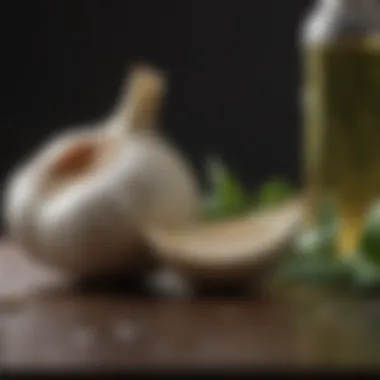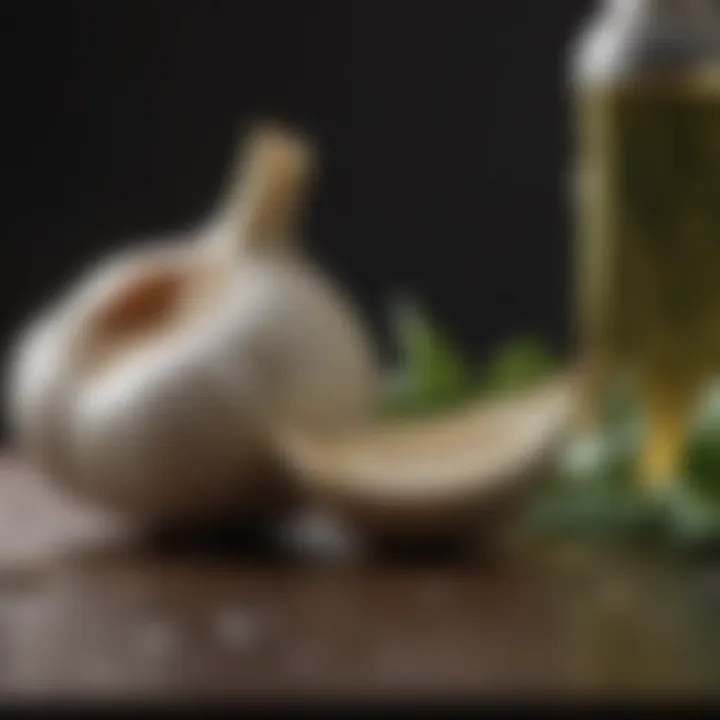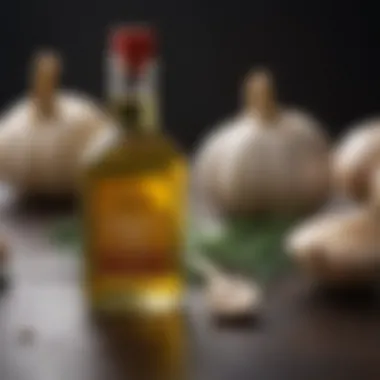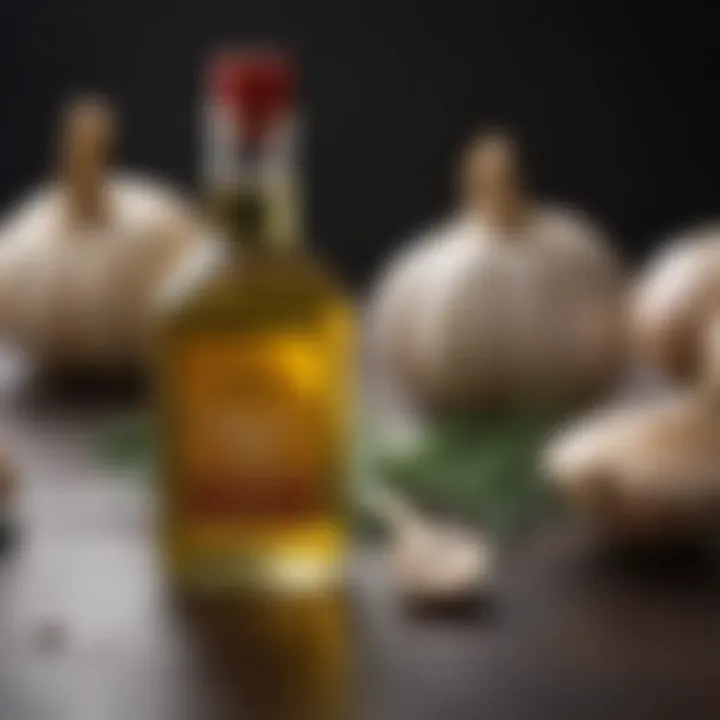Garlic Oil Spray for Mosquitoes: Efficacy and Application


Intro
In today's world, eco-friendly pest control methods gain importance. With rising concerns about the environment and health, many individuals look for natural alternatives to chemical repellents. One such solution is garlic oil spray. Known for its pungent aroma, garlic has been a common ingredient in cooking for centuries. However, its efficacy in repelling unwanted pests, particularly mosquitoes, is notable. This article delves into the scientific basis for using garlic oil against mosquitoes. It also provides insights into preparation methods and application strategies, ultimately evaluating its strengths and limitations in comparison to traditional repellents.
Understanding the Pest
Identification
Mosquitoes belong to the family Culicidae. Identifying them usually involves looking for their slender bodies and long legs. They are small, flying insects with a characteristic buzzing sound and are primarily active during the warm months. Most notable species that are commonly found include Aedes, Culex, and Anopheles. A mature mosquito can range in size and usually emerges from a pupa state in water bodies.
Life Cycle
The life cycle of a mosquito consists of four main stages: egg, larva, pupa, and adult. The cycle begins when a female mosquito lays eggs in stagnant water. These eggs hatch into larvae, which live in the water and feed on organic matter. After a period, they transform into pupae. This stage lasts until they emerge as adults. The entire process can take as little as a week under optimal conditions, making mosquitoes prolific breeders.
Pest Prevention Strategies
Environment Modification
Preventing mosquito infestations involves modifying the environment. Eliminating standing water is crucial, as this serves as breeding grounds. Regularly check gutters, flower pots, and bird baths to ensure they do not hold stagnant water. Also, keeping your garden well-maintained can deter mosquitoes by reducing their natural habitats.
Physical Barriers
Using screens on windows and doors can create effective barriers to keep mosquitoes out of the home. Additionally, wearing long sleeves and using insect repellent on exposed skin further minimize the chances of bites. Fans can also be used outdoors; they create airflow that makes it difficult for mosquitoes to fly.
Control Methods
Chemical Control
Chemical repellents, such as DEET or picaridin, exist as the most common solution for mosquitoes. While they are effective, concerns about chemical exposure have arisen. Many individuals prefer finding a natural alternative like garlic oil spray.
Biological Control
Biological control methods involve using natural predators to manage mosquito populations. This can include introducing certain fish species that eat mosquito larvae or using bacteria that specifically target mosquito pests without harming other wildlife.
Garlic oil spray acts as a natural repellent, taking advantage of garlic’s strong smell and properties to deter mosquitoes while being safer for the environment.
Garlic oil spray can be an effective, eco-friendly method to keep mosquitoes at bay. Understanding your pest and exploring various prevention and control methods is essential in choosing the best solution. This ensures not only personal comfort but also contributes to a healthier ecosystem.
Prolusion to Garlic Oil as a Mosquito Repellent
The increasing preference for natural pest control methods has led many to explore solutions like garlic oil for repelling mosquitoes. Traditional repellents often contain synthetic chemicals, which can raise concerns about health and environmental impacts. Garlic oil provides an alternative that aligns with the interest in eco-friendly products. Understanding how garlic oil functions as a mosquito repellent is essential for homeowners and individuals looking for safe options to protect their living spaces.
Understanding Mosquitoes and Their Behavior
Mosquitoes are among the most pervasive pests, especially in warmer climates. They are attracted to carbon dioxide, warmth, and certain body odors. Female mosquitoes require blood for egg development, which drives them to seek hosts. Understanding these behaviors is critical to developing effective repellents, including garlic oil spray. The strong scent of garlic has been noted to interfere with mosquitoes' ability to locate their hosts, making it a potential repellent.
Factors such as the time of day and environmental conditions also play a role in mosquito activity. They are more active during dusk and dawn and are typically drawn to standing water, which serves as breeding grounds. Educating oneself about these traits can enhance the effectiveness of any repellents employed, including natural options like garlic oil.
Historical Uses of Garlic in Pest Control
Garlic has a long history as a natural pest deterrent, dating back to ancient civilizations. From the time of the Egyptians to modern times, garlic has been celebrated not just for its culinary benefits but also for its biocidal properties. Farmers have often used garlic extracts to protect crops from various pests, including mosquitoes.
The strong compounds present in garlic, such as allicin, have deemed it effective against many insects. Historical texts indicate its usage in both agriculture and domestic settings for pest control. This tradition has paved the way for contemporary approaches using garlic, like garlic oil spray, in combating mosquito populations.
The value of garlic in pest management underscores its potential in the modern context, offering a blend of historical precedence and contemporary practical application.
The Science Behind Garlic Oil
The use of garlic oil as a mosquito repellent relies heavily on its scientific properties. Understanding these properties provides insight into why garlic oil can be an effective alternative to synthetic repellents. The efficacy of garlic oil is rooted in its unique chemical composition, which exhibits insect-repelling capabilities. By analyzing these elements, one can appreciate not only how garlic oil functions against mosquitoes but also its broader implications in eco-friendly pest control.
Chemical Compounds in Garlic
Garlic contains many sulfur compounds, with allicin being the most notable. When garlic is crushed or chopped, allicin forms and is responsible for the strong odor many associate with garlic. This pungent aroma is more than just a culinary unique trait; it acts as a natural deterrent for numerous insects, including mosquitoes.


Other significant compounds in garlic include diallyl disulfide and allyl propyl disulfide. These components contribute to the overall insect-repelling properties of garlic oil. Research indicates that these compounds can disrupt the olfactory senses of mosquitoes, which rely heavily on chemical signals to locate hosts for feeding. Thus, the strong smell of garlic may interfere with their ability to detect human presence.
Mechanism of Action Against Mosquitoes
Garlic oil works through multiple mechanisms to repel mosquitoes. Initially, the strong odor emitted disrupts the mosquito's senses. When mosquitoes breathe in chemical compounds found in garlic oil, it alters their ability to hone in on humans or animals. Consequently, mosquitoes might ignore nearby potential host sites where they would typically land.
Moreover, studies indicate that garlic oil can also impact the nervous system of mosquitoes. When exposed to garlic, certain species exhibit disorientation. This confusion reduces the likelihood of successful landings on hosts.
"Garlic oil has shown promise as a natural repellent, potentially reducing reliance on synthetic chemicals."
Because garlic spray is less harsh than many chemical repellents, it poses a lower risk for those using it repeatedly. The natural formula is generally safer for both humans and animals, making it an appealing choice for households.
Preparation of Garlic Oil Spray
Understanding how to prepare garlic oil spray is crucial for its effective use as a mosquito repellent. This section will outline the necessary ingredients, provide a step-by-step guide on the preparation, and discuss storage recommendations. Getting this process right ensures that the product you create has the maximum potency and can serve its purpose effectively.
Ingredients Required
When preparing garlic oil spray, the quality of the ingredients is key. Here is a list of the essential components needed:
- Fresh Garlic: The primary ingredient. Fresh garlic bulbs offer the highest potency.
- Carrier Oil: Olive oil, coconut oil, or mineral oil can be used as a medium for extracting compounds from garlic.
- Water: Distilled water is recommended to avoid chemical contamination.
- Emulsifier (optional): Products like natural soap can help mix oil and water if desired.
Each ingredient contributes to the effectiveness of the spray. Fresh garlic contains allicin, which is responsible for the repellent characteristic. The carrier oil helps in application and skin adherence.
Step-by-Step Preparation Guide
Making garlic oil spray is a simple process. Here’s how to do it:
- Chop the Garlic: Take 8-10 cloves of fresh garlic and finely chop or crush them. This process helps release the beneficial oils.
- Combine Ingredients: In a glass jar, combine the chopped garlic with 1 cup of your chosen carrier oil. Mix well.
- Infuse the Oil: Allow the mixture to sit in a warm place for two to three days. This period allows compounds in garlic to infuse into the oil effectively. Stir the mixture daily to enhance infusion.
- Strain the Mixture: After the infusion period, strain the oil using a fine cheesecloth or a coffee filter to remove garlic solids.
- Mix with Water: Depending on the concentration desired, mix one part of garlic oil with one part of distilled water in a spray bottle. If using an emulsifier, add it here.
- Shake Well: Before each use, shake the spray bottle to ensure a consistent mixture.
Storage and Shelf Life
Proper storage is essential to maintain the efficacy of your garlic oil spray. Follow these guidelines:
- Storage Container: Keep the spray in a dark glass or opaque plastic spray bottle to protect it from light.
- Temperature: Store the spray in a cool, dark place. Avoid exposure to direct sunlight.
- Shelf Life: Properly stored, the garlic oil spray can last up to a month. It is best to prepare it in small batches to ensure freshness.
Application Methods
The application methods of garlic oil spray are crucial to its effectiveness as a mosquito repellent. Effective use of this natural product necessitates an understanding of where and how to apply it. Knowing the right techniques ensures optimal repellency, maximizing the benefits while minimizing any potential drawbacks.
Target Areas for Application
When applying garlic oil spray, specific target areas will yield the best results. Focus on places where mosquitoes are likely to breed and inhabit. Common areas include:
- Gardens and Lawns: These spaces often attract mosquitoes due to standing water and dense vegetation.
- Near Entry Points: Windows and doors should be treated to prevent mosquitoes from entering homes.
- Patios and Decks: These outdoor living spaces often become gathering spots for both people and pests.
- Underneath Plants and Shrubs: Mosquitoes like shaded and humid environments, making foliage an ideal target.
Utilizing garlic oil spray in these areas creates a protective barrier that can deter mosquitoes effectively.
Frequency of Application
Garlic oil spray requires regular application for sustained effectiveness. It is vital to reapply the spray especially after rain or irrigation, which can wash away the repellent. A common recommendation is to apply the garlic oil spray every 5 to 7 days to maintain a strong deterrent presence. Consider factors such as:
- Humidity: High humidity can increase mosquito activity, warranting more frequent applications.
- Wind Conditions: Strong winds may reduce the effectiveness of the spray, suggesting a need for additional application.
Establishing a consistent schedule not only reinforces its efficacy but also ensures that the garlic oil spray remains potent against incoming mosquitoes.
Safety Precautions During Use
While garlic oil is a natural option, certain safety precautions should be taken into account during application. Addressing these ensures a smoother experience with fewer risks. Follow these advice:
- Wear Protective Gear: Use gloves and a mask during preparation and application to avoid skin irritation and inhalation.
- Test for Allergies: Before the first use, apply a small amount to a patch of skin to check for potential allergic reactions.
- Avoid Ingestion: Keep the garlic oil spray away from food and avoid applying on surfaces that may come into contact with food items.
- Store Properly: Ensure that the container is labeled and stored securely to prevent accidental exposure to pets or children.
Remember to always read guidelines for any natural product you use to avoid unnecessary risks.
By incorporating these methods into practice, homeowners can greatly enhance the effectiveness and safety of garlic oil spray as a mosquito repellent.


Efficacy of Garlic Oil Spray
The efficacy of garlic oil spray as a mosquito repellent stands central to its appeal among those seeking natural pest control methods. Understanding how effective this spray can be not only assists consumers in making informed choices but also emphasizes the potential it holds when compared to conventional chemical repellents. Various elements play a role in its effectiveness, such as the concentration of garlic oil, the method of application, and even environmental factors.
Comparative Studies on Repellency
Many studies have been conducted to evaluate the repellency of garlic oil spray against mosquitoes. In one notable study, researchers found that garlic oil exhibited significant mosquito deterrent properties. The concentration of garlic oil tested, along with the specific application methods, were crucial in determining its efficacy.
A common benchmark for measuring the effectiveness of repellents is the minimum effective concentration. This allows researchers to compare how well various natural and synthetic products stand against one another.
- Research Findings: Some studies indicate that garlic oil can provide a similar level of protection to synthetic repellents like DEET. However, it is important to note that these results can vary based on the mosquito species and environmental conditions.
- Duration of Effect: The duration for which garlic oil remains effective also plays a critical role. While some studies suggest garlic oil can provide a few hours of protection, others indicate that frequent reapplication may be necessary for sustained efficacy. This contrasts with some synthetic options that may last significantly longer.
"Garlic oil spray shows promise as an eco-friendly alternative to conventional repellents, yet its effectiveness may waver based on application frequency and concentration."
User Reports and Anecdotal Evidence
User experiences and anecdotal evidence provide valuable insights into the real-world efficacy of garlic oil spray. Many households have started to embrace this natural alternative, leading to a wealth of shared experiences online.
- Positive Feedback: Users often report a decrease in mosquito encounters when utilizing garlic oil. Many highlight its pleasant aroma compared to chemical sprays.
- Limitations Noted: On the other hand, some users have reported mixed results, particularly in heavily infested areas. In such cases, the need for reapplication was often emphasized.
While empirical studies offer robust data, anecdotal evidence helps paint a fuller picture of how garlic oil performs under various conditions. Community forums and social media platforms like Reddit and Facebook often serve as platforms where users share their findings and tips.
Advantages of Using Garlic Oil Spray
Using garlic oil spray for repelling mosquitoes offers several advantages that make it a compelling option for pest control. As concerns about synthetic chemicals rise, garlic oil serves as a natural alternative that aligns with eco-friendly practices. This section discusses key elements, specific benefits, and considerations surrounding garlic oil spray, emphasizing its relevance to homeowners seeking effective yet safe pest control methods.
Natural and Eco-Friendly Solution
Garlic oil is derived from natural ingredients, making it a favorable choice for those prioritizing environmental sustainability. Unlike conventional insect repellents that often contain harsh chemicals, garlic oil is biodegradable. This means it breaks down naturally without causing long-term damage to the ecosystem. Furthermore, using garlic oil can minimize the risk of chemical runoff into water sources, which is especially crucial for protecting local wildlife and plants.
Homeowners can appreciate that garlic oil is not only effective against mosquitoes but also promotes a healthier living environment. Many commercial repellents emit unpleasant odors and utilize complicated compounds that may irritate or confuse users. In contrast, garlic oil has a distinctive smell that may not be as overwhelming, providing an inviting and less intrusive alternative for families.
Using garlic oil aligns with the growing demand for organic and natural products in the market. With the rise of clean living trends, many people are seeking solutions that not only serve a functional purpose but also reflect their commitment to a sustainable lifestyle. For those who prefer an ecological approach, garlic oil spray represents a viable method for controlling mosquito populations.
Health Considerations for Humans and Pets
Another significant advantage of garlic oil spray is its health safety for both humans and pets. Many synthetic repellents raise concerns regarding allergic reactions or toxic effects on families and animals. They can provoke skin irritations or respiratory issues when applied or inhaled. In stark contrast, garlic oil offers a level of safety that is appealing for caregivers and pet owners.
Garlic contains compounds such as allicin, which not only repel pests but may also provide health benefits for humans. Some studies suggest that garlic can boost the immune system, potentially making individuals less appealing to mosquitoes. Additionally, as garlic oil is a natural product, households can feel more secure knowing they are not introducing harmful chemicals into their environment.
It's vital to conduct patch tests when applying garlic oil spray for the first time, as individual sensitivities may vary. While generally safe, some individuals may have sensitivities to garlic, leading to skin reactions. By ensuring proper application, users can effectively benefit from its mosquito-repelling properties while minimizing health risks.
"Choosing natural alternatives like garlic oil not only protects against pests but promotes overall health and environmental wellness."
Limitations and Considerations
When discussing garlic oil spray as a mosquito repellent, it is essential to address its limitations and considerations. While garlic oil presents a natural alternative, no solution is without its drawbacks. Understanding these limitations helps users make informed decisions.
Effectiveness Against Other Pests
Garlic oil spray is primarily marketed as an insect repellent against mosquitoes. However, its effectiveness against other pests can vary significantly. While certain insects may be deterred by garlic, others might not be affected at all. Research illustrates that while garlic oil can repel some pests like aphids and certain beetles, it does not guarantee total control over a range of insects.
In practice, many household pests such as ants, cockroaches, and termites have shown varied responses. The effectiveness of garlic oil often depends on concentration levels and the specific species. It is crucial for users to realize that garlic’s properties do not ensure comprehensive pest elimination, and it may need to be used in conjunction with other pest management strategies for broader effectiveness.
Comparative Effectiveness with Synthetic Repellents
When comparing garlic oil spray to synthetic repellents, there are notable differences in effectiveness. Conventional repellents, such as DEET or picaridin, have undergone extensive testing and are known for their high efficacy rates against mosquitoes. In contrast, garlic oil’s effectiveness can fluctuate based on various factors, including application method and environmental conditions.
Some studies indicate that synthetic repellents tend to last longer and provide more robust protection than garlic oil. While garlic oil may provide some level of protection, its duration and potency are generally less than those found in synthetic options.
Users should be cautious when relying solely on garlic oil spray, especially in areas with high mosquito populations or during peak activity seasons. Ideally, employing garlic oil as a supplementary measure, rather than the primary defense, will likely yield better results. This ensures there is a strategic blend of natural and synthetic repellents operating together, enhancing overall effectiveness.
"While garlic oil can be a useful part of your pest management toolkit, it is not the sole solution."


In summary, acknowledging the limitations of garlic oil spray is important for setting realistic expectations. Understanding its effectiveness against different pests and comparing it with synthetic options can aid in adopting a balanced approach to pest control.
Combining Garlic Oil with Other Repellents
Combining garlic oil with other repellents can enhance its effectiveness against mosquitoes. This approach allows users to create a more potent formula, maximizing the benefits of both natural and synthetic ingredients. The combination may result in broader protection against a variety of pests while addressing any limitations associated with garlic oil alone.
Synergistic Effects
Synergistic effects occur when two or more substances work together to create a greater effect than when used separately. In the context of garlic oil, this can mean blending it with other natural repellents, such as citronella or eucalyptus oil. The interaction between chemical compounds in these oils can lead to enhanced repellency. For example, citronella, known for its mosquito-repelling properties, can complement the action of garlic oil.
The combination not only provides a more robust defense against mosquitoes but may also extend the duration of protection. It's essential to find the right balance of ingredients to achieve this synergy without compromising the safety and health of users.
Formulations for Enhanced Efficacy
To create effective formulations that combine garlic oil with other repellents, consider the following components:
- Carrier Oils: Use oils like coconut or olive oil as a base. These oils help dilute the garlic oil and other oils, making them safe for skin application.
- Essential Oils: Blend garlic oil with essential oils such as lemon eucalyptus or peppermint. Each of these oils brings unique mosquito-repelling properties that can enhance the overall efficacy.
- Emulsifiers: If creating a spray, emulsifiers help to mix oil and water effectively, ensuring a consistent application. This is especially useful in making a product that remains effective when sprayed on surfaces.
When developing a formulation, it is crucial to test different ratios of these ingredients to find the most effective mixture. Additionally, consider user preferences for scent and skin sensitivity.
Combining garlic oil with other natural repellents can provide a more extensive shield against mosquitoes, achieving superior results compared to using garlic oil alone.
By understanding the synergistic effects and formulating the right mixtures, users can benefit from an improved and eco-friendly solution to mosquito control.
Environmental Impact of Garlic Oil Use
The environmental impact of garlic oil use as a mosquito repellent is a crucial aspect of its overall efficacy and desirability. In recent years, there has been an increasing awareness of the ecological ramifications of pest control methods. This section will explore specific elements such as the biodegradability of ingredients, potential effects on beneficial insects, and how garlic oil serves as a sustainable alternative to synthetic repellents.
Biodegradability of Ingredients
Garlic oil is derived from natural sources, primarily Allium sativum. One of the significant advantages of garlic oil is its biodegradability. Unlike many synthetic chemicals used in conventional mosquito repellents, garlic oil breaks down into non-toxic components when exposed to environmental factors such as sunlight, moisture, and microbial activity.
This process contributes to reducing chemical runoff that can pollute water bodies. Homeowners can feel assured that using garlic oil will not lead to prolonged contamination of their gardens or surrounding ecosystems.
Key points regarding biodegradability include:
- Garlic oil ingredients decompose naturally over time.
- It minimizes the risk of environmental pollution.
- Non-toxic residues contribute to a safer environment for plants and animals.
In contrast, synthetic repellents often contain compounds that persist in the environment, raising concerns about long-term effects on soil and water quality. The use of garlic oil can be seen as a step toward eco-friendliness, aligning pest control with natural systems.
Potential Effects on Beneficial Insects
The potential effects of garlic oil on beneficial insects are another vital consideration. While garlic oil is known for its mosquito-repelling properties, its impact on other insects must be carefully examined. Many beneficial insects, such as bees and ladybugs, play essential roles in pollination and natural pest control within ecosystems. Overexposure to repellents, even natural ones, could disrupt these roles.
However, studies indicate that garlic oil is less harmful to beneficial insects compared to synthetic pesticides. When applied correctly, garlic oil can selectively repel mosquitoes without significantly affecting the broader insect population.
Considerations regarding beneficial insects include:
- Research shows that garlic oil has a lower toxicity to beneficial species.
- Properly timed applications can minimize adverse effects on non-target insects.
- Promoting natural predators in the garden while controlling mosquito populations.
The use of garlic oil represents a conscientious choice for pest control, balancing the need to repel mosquitoes while preserving beneficial insect populations.
Adopting garlic oil is a step towards responsible pest management that respects and promotes biodiversity in residential environments.
End and Future Directions
The discussion surrounding garlic oil spray as a mosquito repellent encapsulates various facets that merit thoughtful examination. Its efficacy as a natural repellent aligns with growing interests in environmentally friendly pest management solutions. The essence of this presentation lies not only in proving that garlic oil can repel mosquitoes, but also in understanding its broader implications on human health and eco-system balance.
In summary, garlic oil offers a unique blend of advantages. It avoids harmful chemicals common in synthetic repellents. Householders can apply it with a sense of security regarding its health impact on family and pets. Its preparation is straightforward. Thus, creating a garlic oil spray at home becomes a viable and accessible option for many.
Despite the positives, the limitations of garlic oil spray cannot be overlooked. Factors such as diminished efficacy after exposure to elements, and potential ineffectiveness in large infestations raise questions. Understanding these constraints helps users manage expectations realistically.
As we look towards the future, future directions of research are paramount. Enhanced formulations that combine garlic oil with other natural repellents warrant examination. The potential for improving stability and effectiveness can lead to broader acceptability. Moreover, exploring the impacts of garlic oil on beneficial insects is essential. Knowledge in this area can lead to improvements in pest control that does not harm pollinators and other critical species.
Summary of Findings
- Garlic oil spray serves as a natural mosquito repellent with notable efficacy.
- It offers health benefits, being less harmful compared to synthetic alternatives.
- Its preparation is simple, making it accessible for households.
- Limitations include reduced efficacy in certain conditions and potential impacts on non-target species.
Recommendations for Further Research
- Investigate the potential benefits of combining garlic oil with other natural repellents for improved efficacy.
- Conduct studies on garlic oil's long-term effects on beneficial insect populations.
- Explore the variations in preparation methods to increase stability and longevity of garlic oil spray.
- Evaluate user experiences and the effectiveness of garlic oil across different environments and climates.







